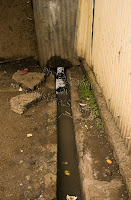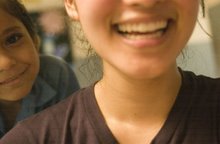Stepping off the plane into
Entebbe Airport in
Entebbe, Uganda, I noticed that the airport is very small.
There’s one small building about the size of 2 houses, and that’s about it.
There is one gate, that building, and a small parking lot no bigger than Kresge Lot at MIT.
The potholes here are crazy, and we play the “pothole” game, offroading to avoid the potholes because the bumpy dirt/grassy area is still smoother than the destructive roads. However, the weather is perfect, reminding me of San Francisco weather where its gets chilly at night, and perhaps a little warm during the day, but really its pretty much perfect. However, the mosquitos are definitely more abundant here than in Kenya or India, apparent from the 30 mosquito bites that I have already acquired.
The ruralness of Uganda surprised me as I’ve heard it being called the “pearl of Africa.” Driving into Kampala, the largest city of Uganda, it was like driving into the old downtown of Nashua, New Hampshire near where I attended high school… little to no tall buildings, no jam packed sidewalks or roads, plenty of space between buildings, and relatively clean air minus the dust and the random spouts of exhaust that clouds around me if a matatu (a mini bus that I believe I described in a Kenya entry) drives by me. Despite being close neighbors and soon to become one nation (I’m embarrassed to say that I just found out that Kenya, Uganda, Tanzania, and several other eastern and central African countries are uniting to become one country under one presidential power), Uganda and Kenya are drastically different in atmosphere, food, landscape, and citylife.
I’ve heard a lot of “I love you’s’ and “You’re so lovelies” which would be flattering minus the fact that I know they probably say it to every foreigner that passes by. I wonder why they say it though. Whether they think those are the only words I’ll know, or whether they want a U.S. Passport. Today I was told “I love you many times.”
They have these public transportation motorcycles called “boda boda” which came from “border border” from when Idi Amin (the old President of Uganda that was insanely corrupt and one of the most feared men) was in reign. People used to try to run away to the border to escape from his reign… and would jump on a motorcycle and say “border border”.. .so now they’re called “boda boda.”
Upon my arrival, I immediately was driven to the vice president’s house for dinner. The vice president of Uganda. Yes, of Uganda. The project that I am documenting is of InterConnection Uganda, an initiative to bring computers and internet access to all of Uganda. It is a private organization that works hand in hand with the government. Biyeun, the MIT student that has been a part of this project from its conception, has been coming to Uganda for the past 3 years to set up computer labs in schools, refurbish computers, and this year, to open up a computer refurbishment center. So we to a party at the vp’s house and I was welcomed by prime ministers and the vice president. There was delicious food and the vice president even began playing a drum at which point Biyeun began to dance. It was very relaxing and quite the experience to rub elbows with some of the highest officials on Uganda.
president of Uganda. Yes, of Uganda. The project that I am documenting is of InterConnection Uganda, an initiative to bring computers and internet access to all of Uganda. It is a private organization that works hand in hand with the government. Biyeun, the MIT student that has been a part of this project from its conception, has been coming to Uganda for the past 3 years to set up computer labs in schools, refurbish computers, and this year, to open up a computer refurbishment center. So we to a party at the vp’s house and I was welcomed by prime ministers and the vice president. There was delicious food and the vice president even began playing a drum at which point Biyeun began to dance. It was very relaxing and quite the experience to rub elbows with some of the highest officials on Uganda.
The excitement didn’t stop. On Sunday, my second day, I went to the State House (the equivalent of the White House to have lunch with the First Lady of Uganda. We were supposed to meet the President too, but he had to leave abruptly for Tanzania. I was overwhelmed to have this honor and a bit embarrassed at getting a chance to meet these high officials when I wasn’t actually involved with Interconnection.
So needless to say, the past couple of days have been a whirlwind, exciting and tiring, and my cold sadly getting worse, but hopefully getting better soon. I had a mango popsicle ice cream with real mangoes in it, chipote with omelette made by a food vendor which I was told should be ok (and I’m not sick yet), a samosa with beans inside… not smushed beans but whole beans… and nothing to hold them together, quite interesting really, and so much more. Ugandan food uses a lot of yams, plantains, rice, meat, plantains, and yams. Basically carbohydrates and meat. With vegetable garnishes. I was definitely spoiled by food for the president and the vp my first couple of meals, but in fact the vendor food is just as scrumptious, though differently so. I’ve also grown quite fond of the high-fibre digestion biscuits which I am convinced I owe my resilient stomach to.
cold sadly getting worse, but hopefully getting better soon. I had a mango popsicle ice cream with real mangoes in it, chipote with omelette made by a food vendor which I was told should be ok (and I’m not sick yet), a samosa with beans inside… not smushed beans but whole beans… and nothing to hold them together, quite interesting really, and so much more. Ugandan food uses a lot of yams, plantains, rice, meat, plantains, and yams. Basically carbohydrates and meat. With vegetable garnishes. I was definitely spoiled by food for the president and the vp my first couple of meals, but in fact the vendor food is just as scrumptious, though differently so. I’ve also grown quite fond of the high-fibre digestion biscuits which I am convinced I owe my resilient stomach to.
 experience has that type of feeling. As if I just partied too hard, fell asleep, and I’ve only just awaken, when I have hours to myself to sit and reflect upon what has happened. It doesn’t feel like the experiences were my own, but rather like I cannot remember what has happened to me, or when it was I fell asleep, but my dreams were filled with these experiences. A fellow traveler I met commented that while traveling is a great experience, in the end, when you return, it is never really the most exciting… more so it makes you want to travel more and continue… a drug in its own way that forges a powerful addiction.
experience has that type of feeling. As if I just partied too hard, fell asleep, and I’ve only just awaken, when I have hours to myself to sit and reflect upon what has happened. It doesn’t feel like the experiences were my own, but rather like I cannot remember what has happened to me, or when it was I fell asleep, but my dreams were filled with these experiences. A fellow traveler I met commented that while traveling is a great experience, in the end, when you return, it is never really the most exciting… more so it makes you want to travel more and continue… a drug in its own way that forges a powerful addiction.  When your life does not feel like your own, what do you do? How do you preserve those memories, those details? Some choose to blog regularly or keep a journal of some sort so they can return to their musings and thoughts at a later time. As you can tell by my delay in postings, this is not something I’m so good at. And this is summer. Videography, photography, scrapbooking, collecting souvenirs… all attempts to remember a past time. To keep your life from being forgotten… for if you forget it, who will remember it? But then perhaps that is the trick. Perhaps it’s not your own experiences that make the difference, but the experiences others have because of you. Men and women of power built pyramids and palaces to go down in the history books… a mode of immortality, a way to make sure that your life is remembered, a way to make sure that your life was not merely a fleeting speck in a galaxy of lifetimes. But I digress.
When your life does not feel like your own, what do you do? How do you preserve those memories, those details? Some choose to blog regularly or keep a journal of some sort so they can return to their musings and thoughts at a later time. As you can tell by my delay in postings, this is not something I’m so good at. And this is summer. Videography, photography, scrapbooking, collecting souvenirs… all attempts to remember a past time. To keep your life from being forgotten… for if you forget it, who will remember it? But then perhaps that is the trick. Perhaps it’s not your own experiences that make the difference, but the experiences others have because of you. Men and women of power built pyramids and palaces to go down in the history books… a mode of immortality, a way to make sure that your life is remembered, a way to make sure that your life was not merely a fleeting speck in a galaxy of lifetimes. But I digress. 


























